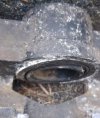sir-vivor
Well-Known Member
Thanks got a quote from Ship happens , I'm set but thanks for reply , tried to delete it after I got feed back from ship happens but guess you were just to quick lol .
Thanks got a quote from Ship happens , I'm set but thanks for reply , tried to delete it after I got feed back from ship happens but guess you were just to quick lol .
Good idea. Gonna give that a goHave discs brakes, I carry a garden sprayer with salt away mix. Rinse brakes, calipers after dunking in salt every time. Prolongs life.
Tandem axle?I switched from drums to DEXTER 3.5K Calipers and Titan Surge Brake actuator 10 years ago. I'm doing regular maintenance on them and changing brake pads this week - there isn't so much as a speck of rust on them. Couldn't be happier. Check out these guys for the best pricing I've seen anywhere: https://www.easternmarine.com/disc-brake-parts
Single.Tandem axle?
Is a surge system good for a 2500# boat?Single.
Trailer Brake Requirements
Surge brakes are not legal if the gross trailer weight is more than 2800kg. |
Yes but not all vehicles have a brake controller. so surge brakes are good for ~5000lbs and any vehicle can tow it. But if I were to do it again I would get disc brakes from the states.Nakoda, if you ever own a electric/hydraulic system you will never go back to surge. The braking is so much more responsive, its instant and you can adjust the sensitivity and amount of braking on the fly from the cab. The one thing I like is that bleeding the brakes is so much easier...just pull the emergency runaway switch which turns on the hydraulic pump, then crack your caliper until no more air is present and that brake is done. Surge brakes are APITA to bleed, even more so if the trailer has no boat on it.

I though it was "Discs cost double, but last twice as long" to accurately quote a Striper owning engineer. He also said rebuild your calipers and throw away the pads every winter if you want to avoid problems.If you have the time backing the shoes off during storage helps as well, but I have definitely fixed brakes with a smart rap with a lead hammer.
A wise man once told me disc brakes on trailers cost three times as much as drums and last twice as long
Without seeing it I would replace the Caliper, then dismantle the old caliper and determine if it is still rebuildable, if it is I would order a kit and rebuild it as a spare.I have a broken outer seal "dust boot" on one of my calipers on the trailer. Does anyone go through the trouble of replacing the boot and seal in the calipers or just do you just replace the calipers as a unit?
Thanks for the feedback.Without seeing it I would replace the Caliper, then dismantle the old caliper and determine if it is still rebuildable, if it is I would order a kit and rebuild it as a spare.
